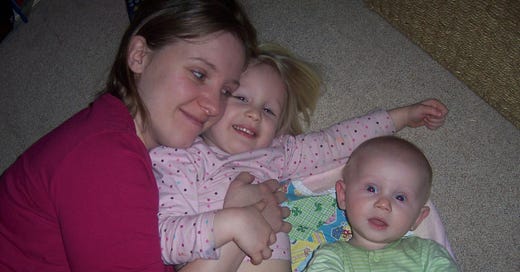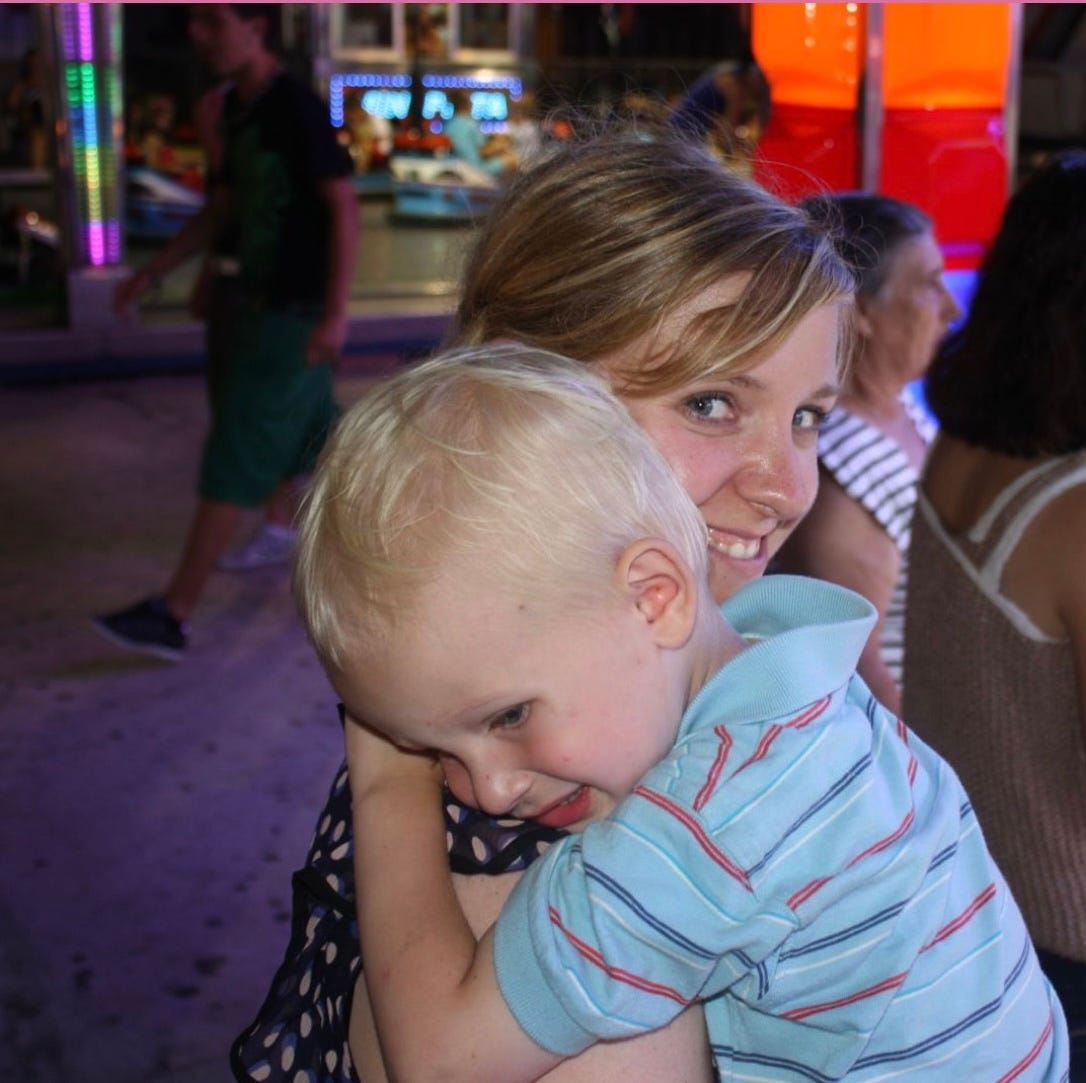There’s a conversation that frequently occurs on the topic of motherhood that I’ve never understood.
I’ve heard it said time and time again, by women of all ages and backgrounds, that throughout their lives motherhood was portrayed as this blissful, idyllic state of joyous perfection where patience and love are available in abundance. That when they became mothers they were utterly shocked at how difficult they found it, how all-consuming, tedious and heinous a lot of it is. They were not expecting to sob and seethe, to feel like they were failing a lot of the time, to have their identities sucked from their souls and be replaced with an exhausted, resentful shell of a woman.
The difference for me, I suspect, is that while I had no idea just how hard being a mother is until I experienced it myself, I was under no illusions that it would be easy or delightful. There were no rosy-cheeked smiles or visions of sugarplums dancing in my head when I thought of what it is to be a parent, which perhaps explains why I hyperventilated when I discovered I was pregnant with my eldest. Certainly, this idealised version of motherhood that others speak of wasn’t what I expected.
Were there some grossly unrealistic and simplified portrayals of motherhood in the media when I was growing up? Of course. When isn’t there? But I can say, hand on heart, that by the time I reached adulthood I had also been exposed to many ‘imperfect mothers’ who loved their children but were far from cookie-baking, apron-wearing visions of sunshine. I also knew this from growing up in my house and seeing it with my own eyes.
My mother was quite far removed from the depiction others were apparently presented with. She worked full time, didn’t come to my extracurricular activities or matches, swore a lot, yelled, slammed things, and sometimes infuriated me. She also created amazing Halloween costumes, helped me with last minute school projects, instilled a love of reading in me, drove me everywhere I needed or wanted to be, and usually apologised after she lost it. Ultimately, she did the best she could under the circumstances, which I was able to appreciate far more when I became a stressed out working mother myself. But never - not once - did I think mothering would be a thing of bliss.
So where is the disconnect between me and my peers coming from? Is it a generational thing? Dependent on class? If you grew up in a nice suburb with parents who were around a lot, who didn’t argue in front of you, who came to every sporting event or play you were ever in, who didn’t worry about how to afford both food and clothes…did that perhaps shield you from some of the realities? I’m not sure, but I know that wasn’t the reality for me.
I know many people subscribe to the school of thought that says mothers should sacrifice their own happiness and leisure time to devote themselves to their families, to always put their needs first, even if it kills them in the process. Yes, of course, children’s safety, education, health, and emotional well-being should ideally be prioritized above all else, in an ideal world. But we don’t live in an ‘ideal world’ and we are not infallible humans without needs or desires of our own.
In our culture it is often said, and accepted as an unassailable truth, that once you have children they must always, always, come first. Well, excuse me, but no. Fuck that. The idea that mothers not only should but must, without exception, put their needs below that of their children’s needs and desires, is, in my opinion, a bunch of misogynistic bullshit.
Look, I’m no authoritarian parent and I’m certainly not a ‘do as I say or else’ type, but our continued acceptance of the overzealous centering of children’s every whim, feeling or desire over our own, every single time, is literally killing us. And even if it doesn’t kill us it is a huge contributing factor to the decline of our marriages, mental health, and overall happiness. We are allowed to say no and not feel ‘mum guilt’ for it.
Does your child want you to play with them but you’d rather stick forks in your eyes than pretend to have a tea party? That’s okay! Are the kids driving you mad with their whining about being soooo bored, expecting you to take them on an expensive day out that you can’t really afford nor want to do? Tell them to suck it up and go play in the dirt! Sometimes - just sometimes - kids need to be reminded that they are not the centre of the universe and that they will live if their parent’s or the household’s needs trump their wishes once in a while.
There’s a reason why married mothers are among the least happy and most stressed groups of people in the Western world. And it’s not because marriage and motherhood are inherently awful, it’s because we allow them to be. The increasingly desperate feeling that it is impossible to do all of the things expected of us, and the sense of isolation we often experience from a community that does not seem at all interested in supporting us, that tells us to suck it up and do it all for love, is not only infuriating, it’s harmful to our health and psyches.
By refusing to address in any meaningful way the gender inequalities that contribute to the overworking and exploitation of mothers, and in how relentlessly we are scrutinised for any perceived flaw or failing, we are actively driving women to the brink of individual burnout and a collective breakdown. Hence all the conversations happening right now about ‘the mental load’.
The concept of the mental load and emotional labour exploded into the wider public consciousness a few years ago and, alongside it, a growing acknowledgement that there are Too Many Things To Do, and women are largely doing them all. Reams of articles, dozens of books, and thousands of videos have been created on this topic and customisable lists created for women to show their families so they can say, ‘Look at this! Look at all the things I do and think and worry about! All the things that are expected of me and must be done, lest I am exiled to the land of Bad Mothers!’
Critics of the mental load discourse dismiss this as whiney, woe-is-me martyrdom performed to garner sympathy for stuff that millions of women do every day. But the framing of this as martyrdom misses what lies beneath these angry missives and massive lists.
Asking society to simply acknowledge women’s unpaid labour - hard, emotional, demanding, relentless labour - is not martyrdom, it’s a cry for help. It is a distress call, an SOS, a desperate attempt to let society know that we are in trouble. It’s not attention seeking or a vain search for validation, it is the last ditch effort of a group of people who are drowning. It is a cry for community, for even just a little of the care and consideration we provide to others, for recognition of our own needs. The lists we make are a way of externalising our pain, a way of making visible the unseen. It is, at its root, a desire to be understood.
No one wants to be a martyr, but women have been conditioned their whole lives to play that role. The idea of self-sacrifice begins virtually from birth for girls, and continues well into adulthood.
At school we are expected to be peacemakers, to share our toys, ensure no one is excluded, smooth over arguments between peer groups, and be a good influence on the more boisterous children (usually boys). We are praised for being quiet, cooperative, obedient, and kind. We are more likely to thrive in academic settings than our male peers and the statistics bear this out all the way through to higher learning. We are more likely to stay in school and earn degrees, because we are good at being ordered, observant, and diligent. The same qualities we bring to motherhood and then are accused of weaponising.
It’s the same in the workplace, where we are often relied upon to provide emotional support and training to junior staff, to look out for signs of friction among teams, to placate and minimise the destructive behaviour of more combative colleagues (often men) who ‘rub people the wrong way’ or are brusque in their approach, to keep the wheels of human interrelationships, essential for a company’s success, greased and running smoothly.
Women who fail to live up to the friendly and maternal image foisted upon them are often shunned socially at work, referred to as ‘bitches’ or ‘ballbreakers’, hard-nosed career women who care more about their own success than that of the team as a whole. And that, to some, is an unforgivable betrayal of gender norms. The same people don’t like ‘wet’ men who demonstrate emotional intelligence, demonstrating perfectly how restrictive gender stereotypes harm us all.
The reality is that if we don’t martyr ourselves for the greater good, we are punished. Is it any surprise then that women are running themselves ragged, doing not only the things that need to be done but the things they think should be done lest they are judged as lacking? Telling them to loosen up and stop caring so much about what other people think is disingenuous at best, after a lifetime of being held to inscrutable standards.
The line between ‘selfless’ and ‘martyr’ is so thin that it is only determined by whether the deeds done by that person are valued as important to society and done without fuss. A selfless mother is one who does all of the childcare and chores without complaining. A martyred mother expects some kind of recognition of her unpaid labour or, even worse, complains about it. Silence in the face of exploitation is rewarded. Talking about it or asking for change brings penalties and derision.
Perhaps this is what some women mean when they talk about the idealised version of motherhood they were sold. It’s not that it was framed as simple or blissful, but that they didn’t know they wouldn’t be given the space or words to talk about the identity-destroying sacrificial elements of it. They weren’t betrayed by the women who came before them, they were betrayed by their predecessors’ wholesale silencing.
And that is why so many of us are determined to talk about it now, to let the next generation know that they matter too, that they can and should talk about their unpaid labour and how it doesn’t mean they don’t love their children or being mothers. It is also a reminder that they, we, all of us, must continue to demand change so that our daughters and granddaughters have a better shot at something even remotely approaching equality.
And yes, it is largely down to us, as women, to do so. Men, on the whole, will never be as invested in altering the status quo as we are, because they benefit from it too much. Even men who can acknowledge that, yes, perhaps they could do more and are, in theory, willling to do it if a woman makes them a list (FFS) seem perplexed that offering their services as a hired hand or minion is not sexy, not a partnership, and not equality.
Once again, the work to overhaul the social constraints of unpaid labour is largely down to us. Add ‘take down the patriarchy’ to your list, ladies! Just one more thing to do.
In the meantime, I recommend lowering your standards as much as you can bear. Unless it will cause imminent death, injury, crisis, or chaos, see if you can leave it undone for awhile. No one ever died of an unironed shirt or a sticky floor, and sometimes cereal for dinner is a must. No, we shouldn’t have to live in squalor or send our kids to school with unbrushed hair in order to retain our last shred of sanity, but if the men can do it, so can we.
For those of you in the trenches with young children, you have my unwavering and undying support. I know how insanely difficult it is to raise children, work, and run a household. But my advice to you, as a 40-something woman with nearly-grown kids, who had a complete breakdown after doing far too much for far too long, is to do what you can and no more.
Don’t pay attention to what anyone else is doing, especially on social media. If you find yourself uttering the phrase ‘I should’ in relation to something you feel you ought to do but don’t really want to, bunk that shit off. Delay, delegate, or outsource it if possible, just as you would if you were running a business and were faced with a task that isn’t strictly in your job description or exceeds your workload capacity. Take your holiday allowance and clock off when the next shift worker comes in (i.e. your partner). Don’t work overtime unless it’s been agred in advance and you will get time off in lieu. If you’re expected to be CEO, make sure you benefit sometimes as well. An annual bonus would be nice (a girl can dream).
Remember there is no such thing as ‘perfect’ when it comes to motherhood, and that if you continue to pretend like you’ve got your shit together all of the time, you are only setting the next generation up for failure.
Let them see your mistakes and misgivings.
Let them see your triumps and joys.
Let them know that they are enough, just as they are. As are you.
I don’t currently have a subscription tier for this newsletter, but if you enjoyed this post and want to show your appreciation by giving a small tip, you’d be supporting my ability to show up here and keep writing. If you can’t make a monetary donation but want to show your thanks by liking, sharing, or commenting, that would be really cool too. Thanks for reading!








So so true! I went completely on strike twice when the kids were growing up, just to show them and my husband how much fell apart without me. I also withdrew parts of my labour - washing their clothes and cleaning their rooms when they reached 12. It prompted lots of learning for them about the power of the proletariat, workers' rights, unions and why the right to strike is so important. When they went to uni, both were the ONLY people in their dorms that knew how to use a washing machine.
I think it was maybe easier for women before us because there wasn’t the need for them to work as well. So while they may have been bored or frustrated at home they weren’t having to do all the unpaid work and have a job as well. Plus the lack of family and community support these days. This impossible to do it all.
The best advice I ever had as a new mum was to ‘put my oxygen mask on first’ because if I went down the kids go down as well.